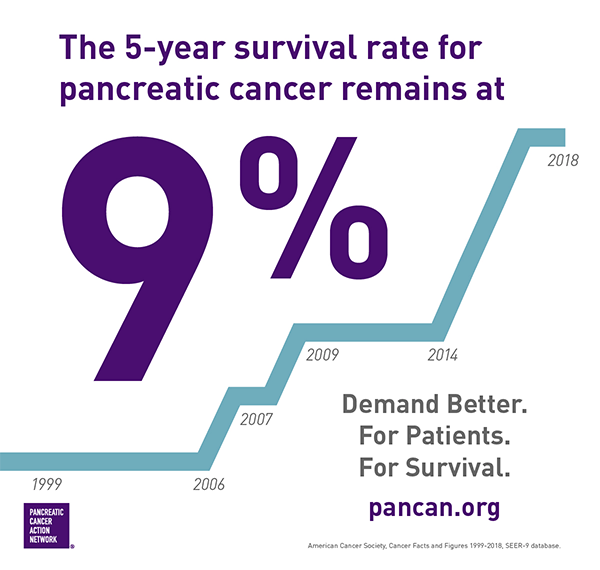
Pancreatic Cancer Remains the Deadliest Major Cancer in the United States
Urgent Funding and Awareness Needed to Improve Outcomes for the World’s Toughest Cancer
MANHATTAN BEACH, Calif. (Jan. 4, 2018) – Pancreatic cancer remains the deadliest major cancer with a five-year survival of just 9 percent*, according to the Cancer Facts & Figures report released today by the American Cancer Society.
“More than 55,000 Americans – mothers, daughters, fathers, sons, colleagues and friends – will be diagnosed with the disease this year and more than 44,000 people will die,” said Julie Fleshman, JD, MBA, president & CEO of the Pancreatic Cancer Action Network (PanCAN). “There remains an urgent need for additional funding, support and awareness in order to improve outcomes for pancreatic cancer patients.”
The disease is the third leading cause of cancer-related death in the United States, killing more people than breast cancer, and is projected to become the second leading cause of cancer-related death around 2020.
The Pancreatic Cancer Action Network is working to improve patient outcomes and double survival by 2020. PanCAN is the only organization that attacks pancreatic cancer on all fronts: research, clinical initiatives, patient services and advocacy.
Clinical trials remain a critical component in improving survival and changing outcomes. That’s because pancreatic cancer patients who participate in clinical research have better outcomes. PanCAN strongly recommends clinical trials at diagnosis and during every treatment decision.
Through its Patient Services, PanCAN provides more resources and speaks with more patients and caregivers than any other pancreatic cancer organization in the world. PanCAN also provides leading-edge patient resources like Know Your Tumor®, a precision medicine service; a Clinical Trial Finder and access to the most up-to-date and comprehensive pancreatic cancer clinical trial database in the United States; as well as the Patient Registry, a global database of patient information to help advance research and improve patient care.
In addition, since 2003, PanCAN has awarded 159 grants to 158 scientists at 58 institutions, with a cumulative research investment projected to be over $48.5 million to date.
“It is vital that we intensify our efforts to double survival and provide groundbreaking research, clinical initiatives and patient services that will improve lives and outcomes,” said Fleshman.
For more information on the Pancreatic Cancer Action Network, visit pancan.org or follow the organization on Twitter, Instagram and Facebook.
*Rates are adjusted for normal life expectancy and are based on cases diagnosed in the SEER 9 areas from 2007 to 2013, followed through 2014.





